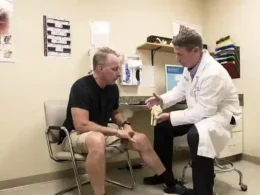While most people often confuse hernia with other abdominal or groin conditions, this painful condition can cause severe consequences, especially if ignored. Hernias primarily develop with physical strain and muscle weakness and can create a visible lump under your skin. Furthermore, though hernias vary in size, location, and severity, they can affect people of all ages and even cause emergencies. Fortunately, this doesn’t necessarily mean that this condition is inevitable as you can overcome it with hernias Sebring treatments.
Though hernias can occur due to various reasons like lifting heavy objects or being obese, most patients don’t comprehend when their condition is severe and necessitates medical intervention. For this reason, let’s examine the leading signs that indicate your hernia requires immediate medical attention.
1. Sudden or persistent pain
While most hernias cause pain and sensations, especially when you strain your abdominal muscles, the pain usually disappears. However, if your pain is worsening with time and isn’t improving, it could indicate a severe hernia complication identified as strangulation. Moreover, the pain might indicate other severe hernia-related life-threatening complications requiring urgent medical treatments.
2. Unusual nausea or vomiting
Because a hernia involves organs of your digestive organs like the stomach and intestines, it can wreak havoc on their specific functionality and cause nausea or vomiting. In severe forms, a hernia can affect your digestive organs by trapping them in your muscle wall, thus inflicting issues like upset stomach, vomiting, or nausea. If you experience severe pain with nausea or vomiting, you should instantly talk to your doctor.
3. Swelling and redness in the hernia site
Although not all types of hernia pose visible symptoms, chances are high that you will notice unusual changes in the affected area. Also, when your hernia is at its worst, you can experience swelling and redness symptoms in the affected site. If you notice such signs, your condition is out of hand, and you need immediate expert treatment.
4. Fever
Several health issues can increase your fever, but that doesn’t exclude hernia. If your fever is above the standard scale and you also have other hernia-rated symptoms, chances are high that your hernia is worsening. Also, if you’re unsure about what might be causing your fever to rise, seek a hernia diagnosis to determine if it’s the reason behind it.
5. Constipation
If your intestines get trapped in the hernia, you cannot pass gas or have a bowel movement. Usually, this signifies your hernia is at a severe stage which can cause bowel blockage or constipation. Furthermore, if you identify changes in bowel behaviors, indigestion, or feelings of heaviness, seek expert diagnosis and treatments soon.
6. Hernia bulge that increases in size quickly
Though hernias vary in size, it’s not normal to have a hernia that quickly increases over a short duration. Also, if the bulge changes in color and becomes purple, red, or dark, it could be a sign that something is wrong. It would help if you visited your doctor to analyze your situation and determine the appropriate treatment option.
Hernias are frustrating conditions that shouldn’t be ignored, even in mild stages. Furthermore, considering the consequences of overlooking this debilitating condition, you should seek early diagnosis and treatments. Although your treatment plan depends on the severity of your condition, minimally invasive surgery is the best option to treat hernia and reduce the risk of occurrence in the future. Don’t allow hernias to take a toll on your quality of life when you can seek advanced medical care soon.











